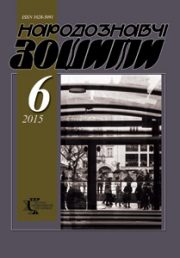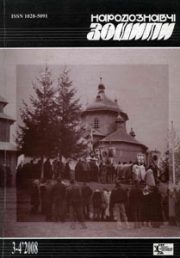The Ethnology Notebooks. 2017, 4 (136), 778–783
UDK 39(=161.2:477.83/.86).”18”:[82.02.09:7.035]
DOI https://doi.org/10.15407/nz2017.04.778
THE VISION OF UKRAINIAN ETHNIC CULTURAL SPACE IN ETHNOLOGY STUDIES
OF THE FIRST HALF OF XIX CENTURY
Kyrchiv Roman Fedorovych – scientist-folklorist,
ethnologist and literary scholar, doctor of philological
sciences (1980), professor (1994), full member of the
Shevchenko Scientific Society (1992), academician
of the Academy of Sciences of the Higher School (1997),
Honored figure of science and technology of Ukraine (2008).
Svobody Avenue 15, 79000, Lviv, Ukraine.
Contacts: e-mail: ina@mail.lviv.ua
Abstract. The article is describes the times when the actual Ukrainian folk studies, in particular such their components as ethnography and folkloristic, native language and history studies, were at the stage of its conception and formation. In Ukraine, as same on other European countries, especially the Slavic ones, this process took place on the basis of strong influence of romanticism ideology — a new trend in social thought, literature, art, science, what strongly stimulated the change of the whole system of world outlook values and guidelines.
Keywords: romanticism ideology, attention to Ukrainian ethnology studies, living historical memory, spiritual community of ordinary Galicians, Cossack`s tradition.
Received 6.06.2017
REFERENCES
Vidomist’ o ruskomiazytsi (1910). Fil’ol’ogichni pratsi Ivana Mohyl’nyts’koho. Vydav Mykhajlo Vozniak. L’viv: Nakladom Naukovoho tovarystva im. Shevchenka. S. 1–70 [in Ukrainian].
Izdatel,’A. Metlinskij.(1839). Zametki otnositel’noj uzhnorusskogo azyka. Dumky, pisni ta schedescho Amvrosiia Mohyly. Har’kov. S. 3–35 [in Russian].
Deshko, A. N. (1850). O Karpatskoj Rusi. Kratkijjetjud.Kievljaninna 1850 god. Kn. 3. Moskva. S. 19–32 [in Russian].
Maksimovich, M. (1841). O pravopisanii malorossijskogo jazyka.Pis’mo k Osnov’janenku.Kievljanin.Izdal M. Maksimovich. Knigavtoraja. Kiev. S. 156 [in Russian].
Maksimovich, M. (1841). O stihotvorenijah chervonorusskih.Kiev ljaninna 1841 god. Izdal Mihail Maksimovich. Kiev. S. 119–152 [in Russian].
Maksimovich, M. (1834). Predislovie.Ukrainskienarodnyepesni, izdannye M. Maksimovichem.Chast’ pervaja.Moskva. S. VI [in Russian].
Malorossijskie I chervonorusskie dumy I pesni.(1836). Sankt-Peterburg. S. 103–104 [in Russian].
Mogil’nickij, I. (1838). O russkom jazyke. Zhurnal Ministerstva narodnogo prosveshhenija.Sankt-Peterburg.Ch. XVII. Kn. 1. S. 17–43 [in Russian].
O drevnosti i samobytnosti Juzhnorusskogo jazyka (1857). Zapiski o Juzhnoj
Rusi. Izdal P. Kulish. T. 2. Sankt-Peterburg. S. 257–279 [in Russian].
Rusalka Dnistrovaia. (1837). U Budymi. S. III–VI [in Ukrainian]..
Steblij, F. (2003). Predtecha «Rus’koitrijtsi». Peremyshl’s’kyj kul’turnoosvitnij oseredok pershoi polovyny XIX st. L’viv. S. 11 [in Ukrainian]..
Filolohichni pratsi Ivana Mohyl’nyts’koho.(1910).L’viv. S. 8 [in Ukrainian]..
Franko, I. (1910). Narys istorii ukrains’korus’koi literatury do 1890 r. L’viv. S. 83.
Shashkevych, M. (1982). Tvory. M. Shashkevych, I. Vahylevych&Ya. Holovats’kyj. Kyiv: Dnipro. S. 194–195 [in Ukrainian]..
Mogilnicki, I.(1829). Rozprawa o ęzykuruskim. Czasopismo Naukowe księgozbioruim. Ossolińskich. Lwów. Zуsz. 3. S. 56–88 [in Polish].







